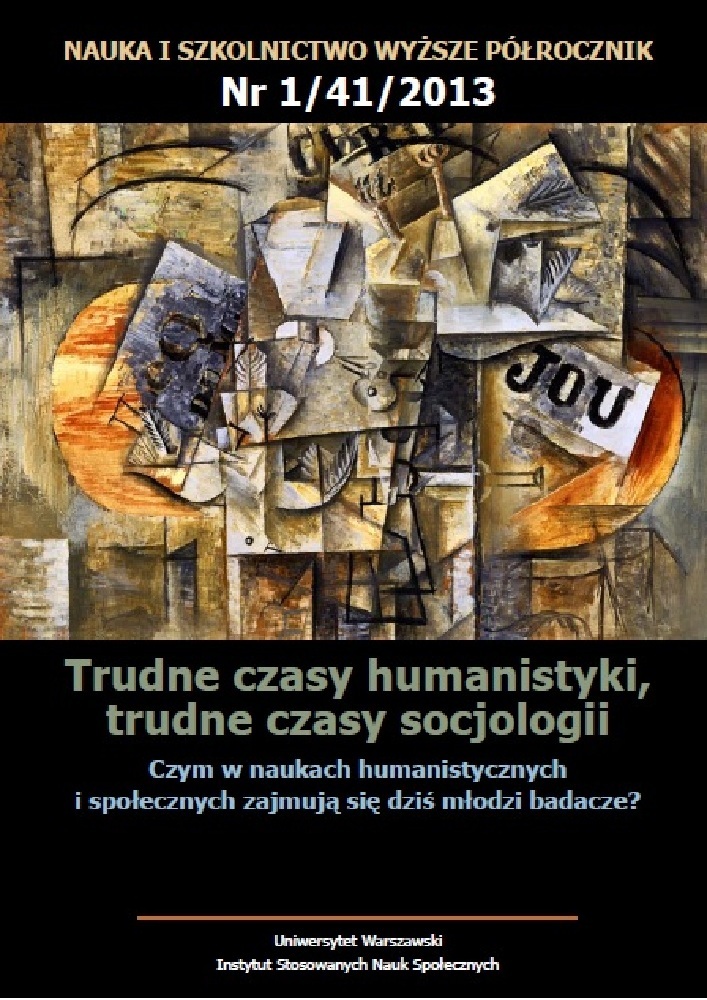Abstract
The main objective of the paper is to present the characteristics and the fundamental principles of the computer assisted qualitative data analysis. The article also includes some examples of free CAQDAS, which are an alternative to the expensive version of this software. It is also the most important functions of the programs, which are obtained at the disposal of users interested in computer assisted qualitative data analysis. The paper is also intended to highlight the most important advantages of CAQDAS and present some of the limitations and potential problems which may result using the software.
References
Bieliński J., Iwańska K., Rosińska-Kordasiewicz A. 2007, Analiza danych jakościowych przy użyciu programów komputerowych, „ASK” 16
Bringer J. D., Johnston L. H., Brackenridge C. H. 2004, Maximizing Transparency in a Doctoral Thesis1: The Complexities of Writing About the Use of QSR*NVIVO Within a Grounded Theory Study, ”Qualitative Research”, 4(2). Dostępny w Internecie: http://qrj.sagepub.com/content/4/2/247 (stan na 10.10.2012)
Bringer J. D., Johnston L. H., Brackenridge C. H. 2006, Using Computer-Assisted Qualitative Data Analysis Software to Develop a Grounded Theory Project, ”Field Methods”, 18(3). Dostępny w Internecie: http://fmx.sagepub.com/content/18/3/245 (stan na 10.10.2012)
Brosz M. 2012, Komputerowe wspomaganie badań jakościowych. Zastosowanie pakietu NVivo w analizie materiałów nieustrukturyzowanych, „Przegląd Socjologii Jakościowej”, 8(1).Dostępny w Internecie: http://www.przegladsocjologiijakosciowej.org (stan na 20.11.2012)
Charmaz K. 2009, Teoria ugruntowana. Praktyczny przewodnik po analizie jakościowej, Warszawa: PWN
Dahlgren L., Emmelin M., Winkvist A. 2007, Qualitative methodology for international public health, Umeå: Epidemiology and Public Health Sciences, Umeå: Umeå University.
Fielding N. 2007, Computer Applications in Qualitative Research, w: Atkinson P., Coffey A., Delamont S., Lofland J., LoflandL. (red.) Handbook of Ethnography, Los Angeles, London, New Delhi, Singapore: Sage Publications
Flick U. 2010, Projektowanie badania jakościowego, Warszawa: PWN
Gibbs G. 2011, Analizowanie danych jakościowych, Warszawa: PWN
Glaser B. G. 1978, Theoretical Sensitivity, San Francisco: University of California
Glaser B. G., Strauss A. L. 1967, The discovery of grounded theory. Strategies for qualitative research, Chicago: AldinePub. Co.
Gorzko M. 2008, Procedury i emergencja.O metodologii klasycznych odmian teorii ugruntowanej, Szczecin: Wydawnictwo Uniwersytetu Szczecińskiego.
Hammersley M., Atkinson P. 2000, Metody badań terenowych, Poznań: Zysk i S-ka
Jones M.Diment K. 2010, The CAQDA Paradox: A divergence between research method and analytical tool, ”The International workshop on Computer-Aided Qualitative Research Asia” (CAQRA2010)
Kelle U. 2005, Computer-Assisted Qualitative Data Analysis, w: Qualitative Research Practise, Seale C., Gobo G., Gubrium J., Silverman D. (red.), London, Thousand Oaks, New Delhi: Sage Publications
Konecki K. 2000, Studia z metodologii badań jakościowych. Teoriaugruntowana, Warszawa: PWN
Lonkila M. 1995, Grounded theory as an emerging paradigm for computer-assisted qualitative data analysis, w: Kelle U. (red.) Computer-Aided Qualitative Data Analysis, London: Sage Publications
Miles M. B., Huberman M. A. 2000, Analiza danych jakościowych, Białystok:Transhumana
Niedbalski J. 2013, Odkrywanie CAQDAS. Wybrane bezpłatne programy komputerowe wspomagające analizę danych jakościowych, Łódź: Uniwersytet Łódzki
Niedbalski J., Ślęzak I. 2012, Analiza danych jakościowych przy użyciu programu NVivo a zastosowanie procedur metodologii teorii ugruntowanej, „Przegląd Socjologii Jakościowej”, 8(1).
Dostępny w Internecie: http://www.przegladsocjologiijakosciowej.org (stan na: 20.11.2012)
Niedbalski J. 2012, OpenCode – narzędzie wspomagające proces przeszukiwania i kodowania danych tekstowych w badaniach jakościowych, „Przegląd Socjologii Jakościowej”, 8(1). Dostępny w Internecie: http://www.przegladsocjologiijakosciowej.org (stan na: 20.11.2012)
Prein G., Kelle U., Bird K. 1995, Computer-Aided Qualitative Data Analysis: Theory, Methods and Practice, London: Sage Publications
Saillard E. K. 2011, Systematic Versus Interpretive Analysis with Two CAQDAS Packages: NVivo and MAX¬QDA, „Forum: Qualitative Social Research”, 12(1). Dostępny w Internecie: http://www.qualitative-research.net/index.php/fqs/article/view/1518 (stanna: 30.09.2012)
Schönfelder W. 2011, CAQDAS and Qualitative Syllogism Logic—NVivo 8 and MAXQDA 10 Compared, „Forum: Qualitative Social Research”, 12(1). Dostępny w Internecie: http://www.qualitative-research.net/index.php/fqs/article/view/1514 (stanna: 30.09.2011)
Seale C. 2008, Wykorzystanie komputera w analizie danych jakościowych, w: Silverman D., (red.), Prowadzenie badań jakościowych., Warszawa: PWN
Silverman D. 2008, Interpretacja danych jakościowych, Warszawa: PWN
Strauss A. L., Corbin J. 1990, Basics of Qualitative Research, London, New Delhi: Sage Publications
Travers M. 2009, New Methods, Old Problems: A Sceptical View of Innovation In Qualitative Research, ”Qualitative Research”, 9(2). Dostępny w Internecie: http://qrj. sagepub.com/content/9/2/161 (stanna: 30.09.2012)
Weitzman E., Miles M. 1995, Computer Programs for Qualitative Analysis, Thousand Oaks, CA: Sage
Wilk K. M. 2001, Komputerowe wspomaganie jakościowej analizy danych, „ASK” 10
Wiltshier F. 2011, Researching With NVivo, „Forum: Qualitative Social Research”, 12(1). Dostępny w Internecie: http://www.qualitative-research.net/index.php/fqs/issue/view/36 (stan na: 30.09.2012)
